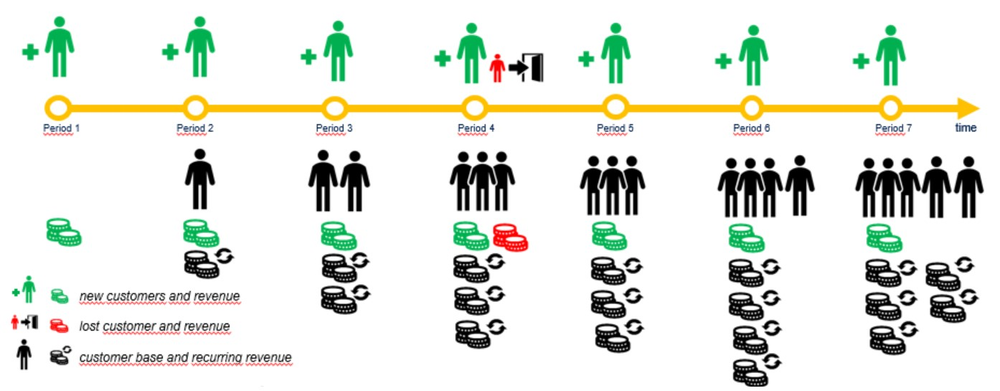Part 2 of an ongoing series
For a long time, managed service providers (MSPs) who provided traditional business backup with on-premise servers and virtual machines were quite profitable. The vast majority of organizations embraced the need and invested willingly. But as the song goes, “the times they are a’changin’.”
Traditional opportunities are declining as businesses look for data protection that includes reduced storage costs and increased convenience.
Today’s business opportunities lie in hybrid cloud services, including rapidly growing segments of cloud Infrastructure as a Service (IaaS), such as Amazon EC2 and Azure, and Software as a Service (SaaS) products like Microsoft 365. As a result, the revenue sources for MSPs are evolving into the pay-as-you-go Subscription Business Model.
The Subscription Business Model offers a tremendous upside to MSPs. Vendors who can develop a solid, loyal customer base are able to generate monthly recurring revenue (MRR) that will keep them profitable and growing well into the future.
What are the benefits of the Subscription Business Model?
As we explained in our first installment about the Subscription Business Model, it delivers benefits to both customers and service providers alike.
To start, customers get incredible convenience. They don’t need to remember when to renew their order, ensuring that their coverage continues uninterrupted. They also can budget more accurately because they have a predictable monthly payment. If a customer needs additional features, those services can added and bundled in a single subscription.
On the other side, MSPs benefit from consistent, recurring sales generated from both new and existing customers – whether users were cultivated from a freemium campaign or a bait-and-hook approach.
For MSPs, one of the most attractive features of the subscription model is its ability to generate monthly recurring revenue (MRR). But how does that work for Infrastructure-as-a-Service (IaaS), Software-as-a-Service (SaaS), and Platform-as-a-Service (PaaS) hosters?
Cultivating long-term, profitable relationships
As we explained in part one of this series, customers spend a lot of time and effort when selecting a cloud storage provider. It is not a process that they want to do every year or even every few years, so as long as the hoster is meeting the requirements of the service level agreement (SLA), the customer will likely continue the relationship.
Savvy MSPs leverage that stickiness to build long-term customer loyalty. They know that the ongoing nature of a subscription-based relationship positions their business as a partner who is invested in helping the client reach a goal, instead of just another vendor looking to complete a project quickly.
By addressing the client’s needs and adapting to changes over time, the service provider creates a sense of loyalty and trust that ensures the longevity of the relationship, builds the MSP’s reputation, and even helps attract new clients. More importantly, it can increase their profits.
Customer retention is the key to recurring revenue
For traditional businesses, it doesn’t matter if they are looking for new projects from existing customers or spending resources mining new customers – they need a new deal to get paid. The problem with that approach is that it can cost 5 to 25 percent more to acquire a new customer than to retain an existing one.
With the Subscription Business Model, your clients have committed to a regular monthly payment. Since keeping them happy is less expensive than constantly tracking down and attracting new business, you can focus more resources on meeting their needs, which maintains a steady revenue stream.
Adding new clients over time serves as a multiplier, which means you are gradually compounding that monthly recurring revenue. In fact, research shows that the longer a client stays with a company, they generate increasing profits each year – just a 5 percent increase in customer retention can increase profits by 25 percent or more.

With the Subscription Business Model, most of the revenue comes from the existing customer base.
Manage the churn
The reality is that you will occasionally lose customers any, often for reasons that are outside of your control. So while a subscription-based businesses generates greater profits by keeping its existing customers satisfied, MSPs still need to add new clients in order to replace lost customers and maintain their revenues, as well as to grow their customer base over time.
The key to weathering the loss of a client is to manage the churn, which measures the percentage of customers who cancel their subscriptions during a specific period of time. Since subscription revenues are generated each month, vendors should look to the monthly churn. As long as new subscriptions outpace the number of canceled subscriptions, you’ll see continuous growth.

Build your subscription business with Acronis Data Cloud
MSPs who want to build a data protection business that is subscription-based should consider the Acronis Data Cloud platform. Designed with service providers in mind, it allows them to offer an all-in-one solution, includes Acronis Backup Cloud, Acronis Disaster Recovery Cloud, and Acronis Files Cloud. The single platform allows them to sell individual services or bundle several depending on their customers needs.
And because Acronis Data Cloud integrates with the most popular hosting automation platforms, service providers can practically customize the pricing based on the needs and business requirements of their clients.
To find out more, please visit https://www.acronis.com/en-us/partners/service-providers/
About Acronis
A Swiss company founded in Singapore in 2003, Acronis has 15 offices worldwide and employees in 50+ countries. Acronis Cyber Protect Cloud is available in 26 languages in 150 countries and is used by over 21,000 service providers to protect over 750,000 businesses.



